According to the new Graduate Outcomes data, over three quarters of graduates go into ‘graduate’ jobs (Graduate Outcome 2017/18, HESA, 2020). While the commentary is that high skilled, graduate jobs (i.e. SOC1-3) have held up well in terms of recruitment compared with low skilled jobs, that is not the case across the board for those graduate occupation categories.
When we look at the labour market indicators, like recruitment activity, it appears that jobs falling into the Technicians and Associate Professional graduate category, SOC3, have not been doing so well. We can see a similar pattern of impact from COVID-19 in terms of hiring activity between those jobs and non-graduate level occupations. Recruitment activity for SOC3 positions has dropped 37% between February and June this year while the other graduate occupation categories have been impacted far less (SOC1, -27%; SOC2, -19%). The only occupation group that has bucked that trend is SOC6, Caring, Leisure and Other Service Occupations, with a reduction in postings of only 14%, which is due to increases in hiring of roles within that category such as Care workers and home carers (SOC6145, +12%) and Ambulance staff (excluding paramedics) (SOC6142, +6%).
Here we see how the higher skilled end of the labour market seems to be holding up well - at least through furlough.
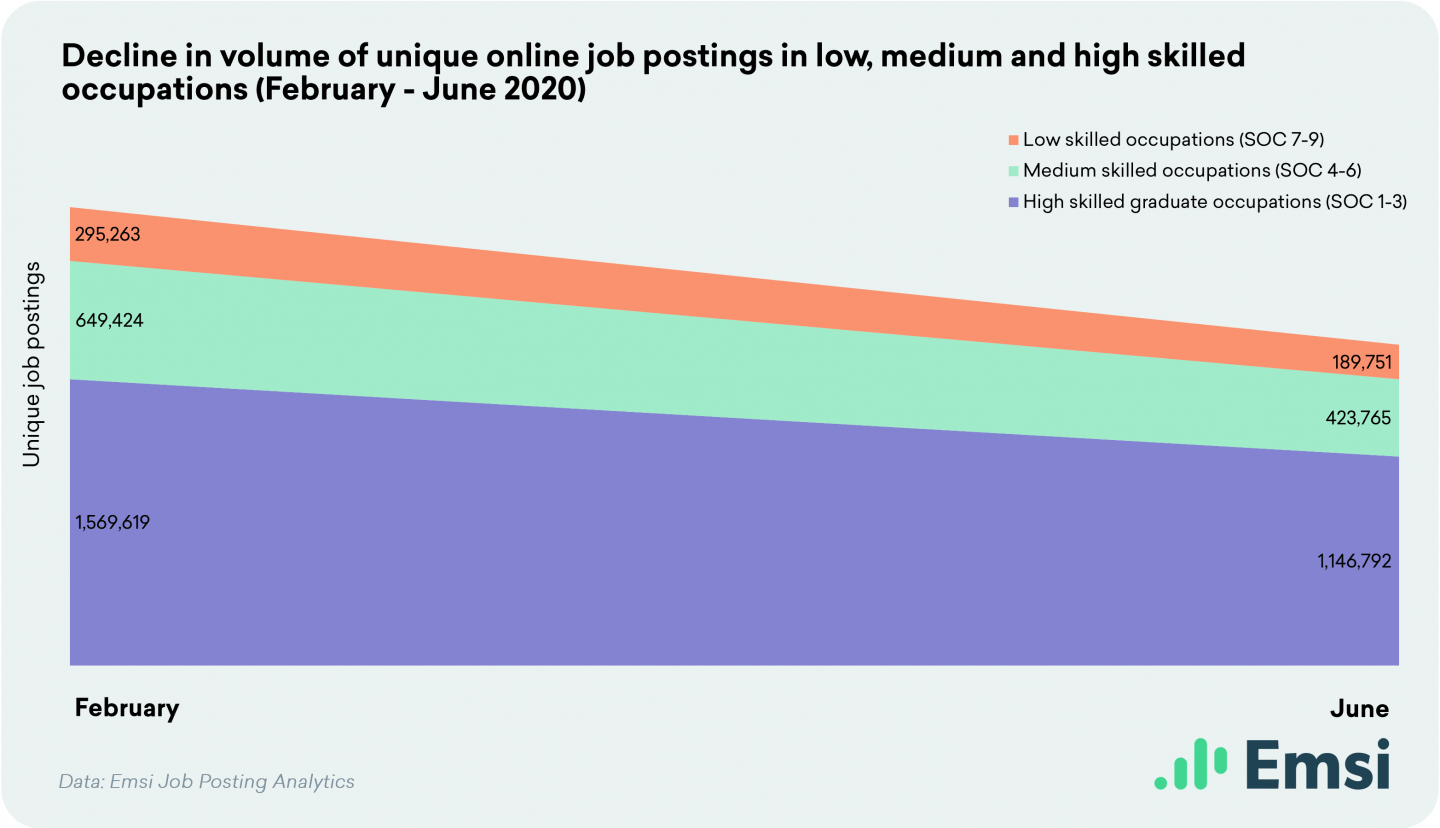
However, when we break out those higher skilled occupations, we can see a sharper decline in recruitment activity in the third tier, SOC3.
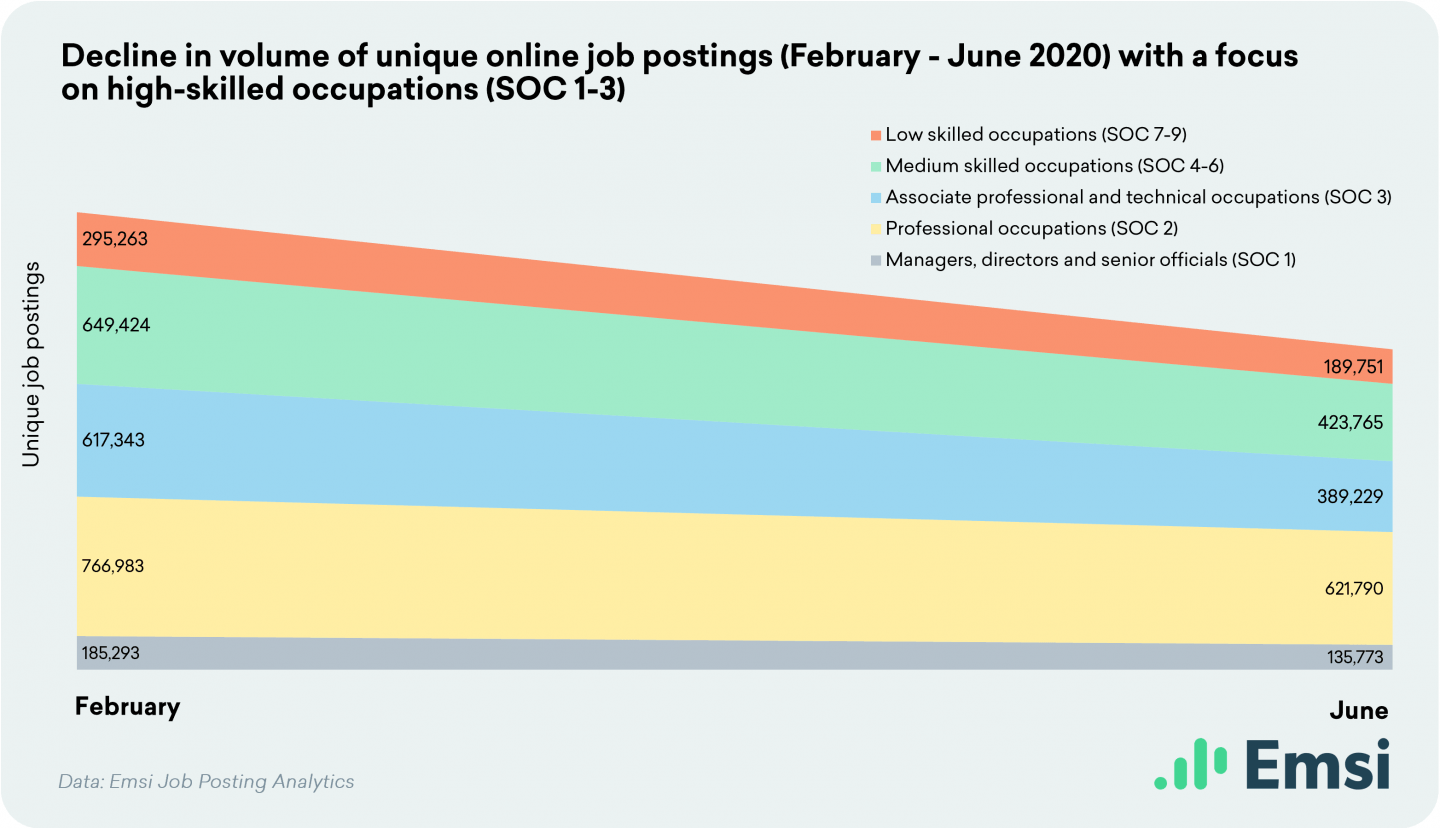
That distinction between the Technician and Associated Professional occupation category and the other graduate categories is important.
Over three quarters (77%) of graduates are in graduate jobs 15 months after graduation (HESA, 2020), so from an Education policy perspective one might reasonably assume the focus in responding to COVID-19 should be on those who aren’t on or planning to undertake a degree. However, the new Graduate Outcomes Survey tells us nearly half (47%) of graduates find themselves in the job categories that span the SOC3 to SOC9 (‘Elementary Occupations’) classifications, including a quarter (24%) in the SOC3 ‘graduate’ category (HESA, 2020).
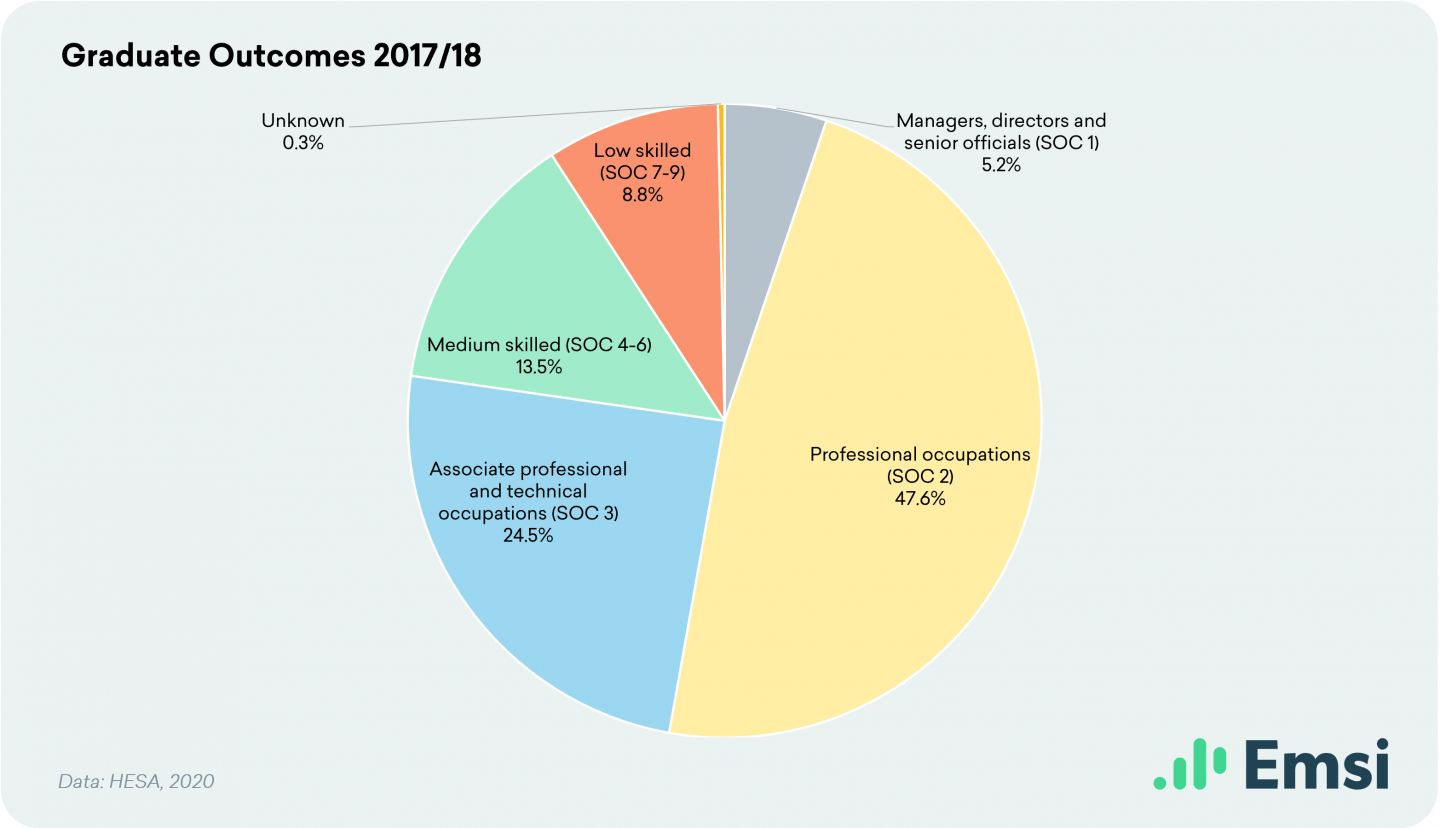
Understanding what is happening in the graduate-level SOC3 occupation group is going to be critical for universities to inform their support for their students as they enter the labour market. It is also important for policy makers and institutions looking at student recruitment as this is looking like the area of the graduate jobs market most likely to under-deliver in terms of employment and ROI.
While recruitment activity is not the same as job numbers, it will be a while before we have all the data from the ONS, so this Big Data is useful as an indicator of where the employment is right now. Examining those job postings for Associate professional and technical occupations at the 3-digit SOC level, we can see where those impacts are happening:
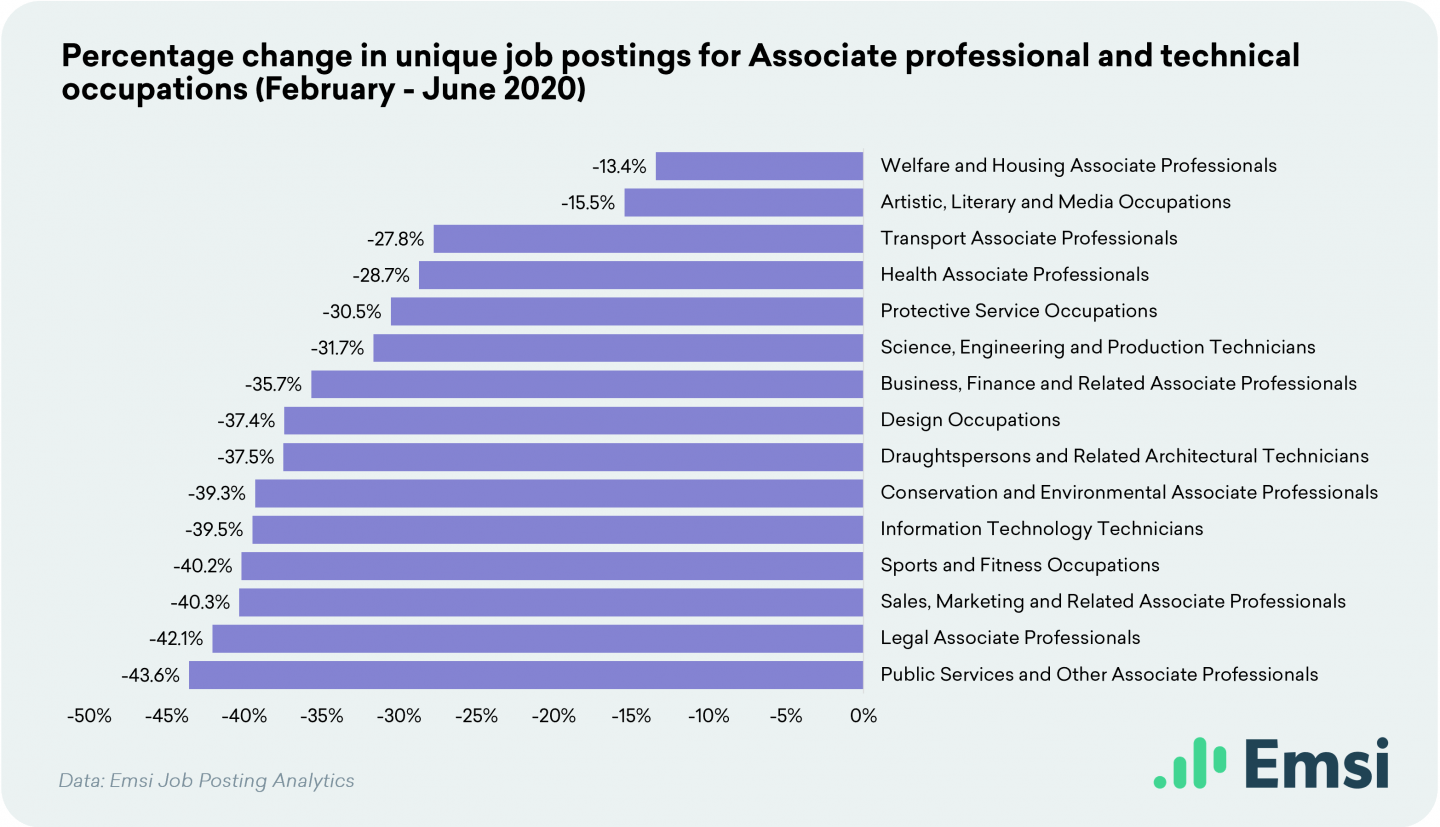
Examining some of these 3-digit SOC3 groupings, Sales, Marketing and Related Associate Professionals (SOC354) comprises roles such as Estate agents and auctioneers (SOC3544) and Sales accounts and business development managers (SOC3545). Public Services and Other Associate Professionals (SOC356) comprising jobs like Careers advisers and vocational guidance experts (SOC3564) and Health and safety officers (SOC3567).
Recruitment activity for roles within those particular examples have significant drops in activity since COVID-19 for all of them, with the steepest being in postings for roles like estate agents by 44% (Emsi, 2020):
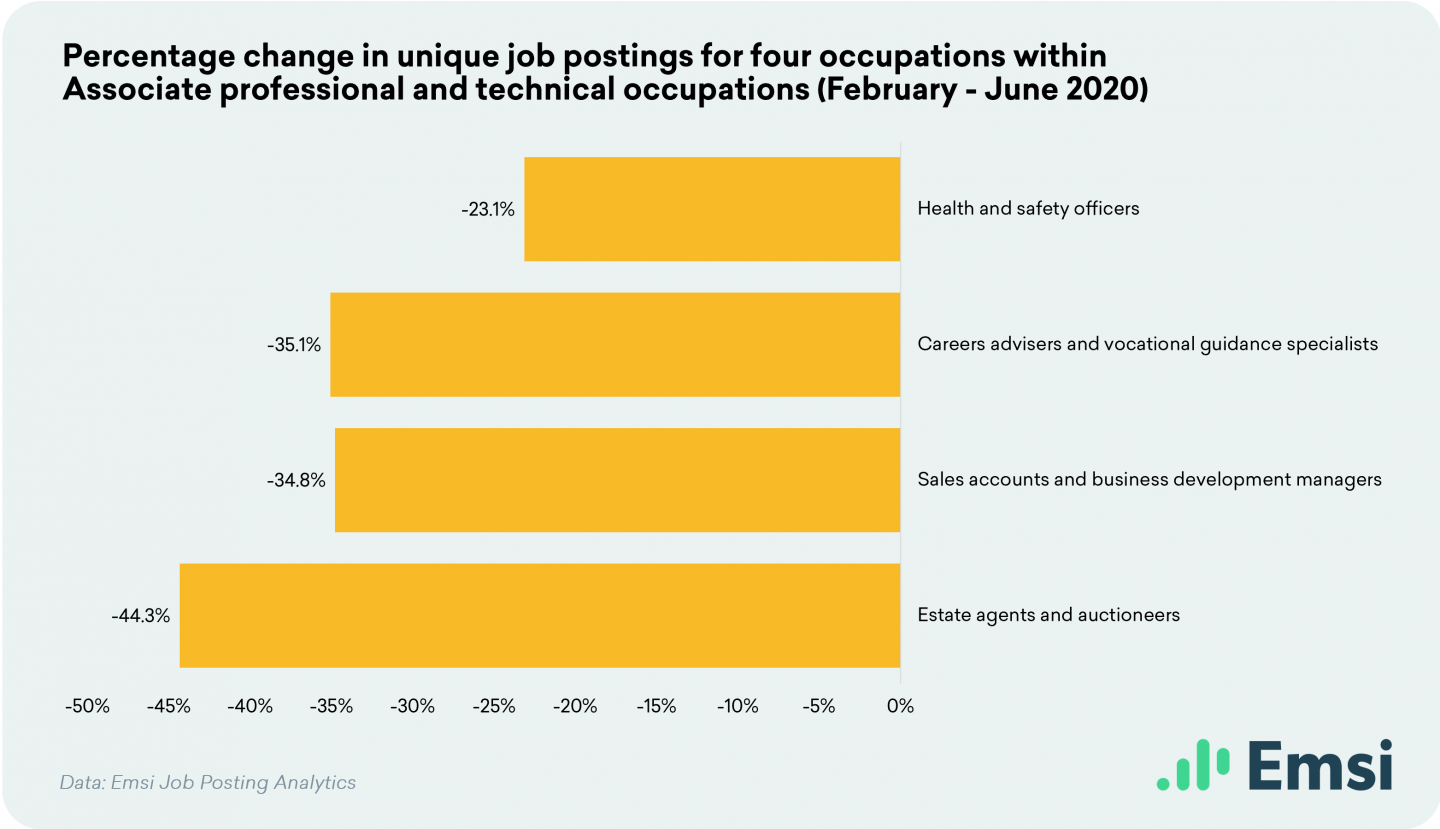
Nevertheless, taking the static data from this snapshot and creating a strategy based on that alone is problematic. Might it be reasonable to assume with rising unemployment there might be a higher demand for careers advisers? Would it not also be reasonable to expect opportunities for Health and Safety Officers to rise? Perhaps the housing market will bounce back, but with social distancing, can one estate agent cover the role of several with increased automation, or could the opposite be true with more people needed because of the additional requirements to make house-hunting a safe activity?
All of the above could be true. Different parts of the country could see different trends. The same occupations working in different industries could have widely differing experiences.
Another very significant factor to take into consideration is competition. If we do see the huge increases in unemployment that are expected once furlough schemes end and as have already started to happen, as well as there being less recruitment, i.e. falling demand, we can expect there to be far more competition for jobs, i.e. increasing supply. For any role, what is more attractive: a fresh graduate or a graduate with a few years’ work experience under their belt? It will be a buyer’s market, challenging awarding institutions to supply graduates who can have an edge in their job-relevant skills and competencies over their more experienced competitors, or challenging graduates to enter the workforce in roles and salaries they may not have otherwise contemplated, or indeed to consider postgraduate Education, or something in between as UUK suggest (Supporting graduates in a post-19 economy, UUK, 2020).
What is possible is to capture and track all of this in labour market data at a local level and have a dynamic response strategically in terms of policy, and tactically, such as in Careers Advice & Guidance. Those institutions and programmes whose graduates typically progress to Technician and Associated Professional (SOC3) roles, are particularly exposed to the economic impact of COVID-19 in terms of their students’ employability outcomes. The HE sector should be wary of taking too much comfort in the narrative of the impact being on the low-skilled end of the labour market, while that is true, the exposure to graduate level jobs is very real.
Richard Hewitt leads on engagement with the UK Higher Education sector at the labour market insight and economic consulting company, Emsi. To learn about how LMI can be accessed and applied by universities, visit https://www.economicmodelling.co.uk/higher-education/.
Find out more about Advance HE's services to support student success. Our solutions are underpinned by our Student Success Framework which provides a national reference point for reviewing and enhancing policy and practice, covering key priority areas that impact upon the quality of learning and teaching excellence.